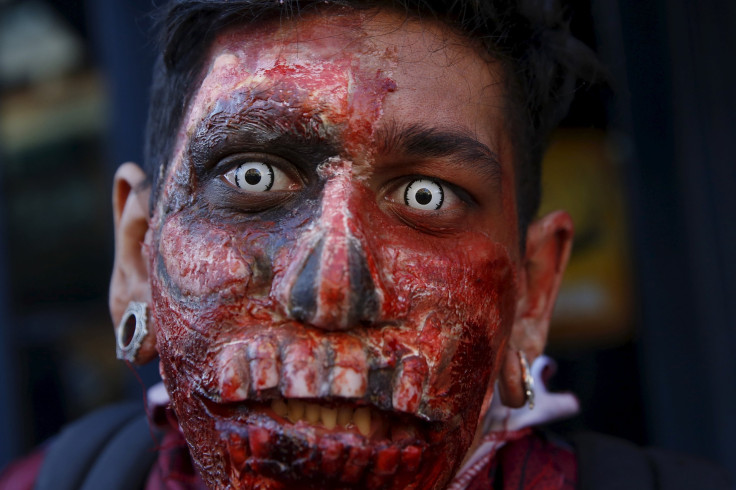Halloween 2015: How Old Is Too Old For Trick-Or-Treating?

A recent Today.com online poll asks its readers: At what age should kids STOP trick-or-treating? The overwhelming response from 3,418 people is “never,” which earned 32 percent of the votes. Coming in a distant second is “age 13” with just 15 percent of the votes, while the answer “age 12” garnered 14 percent. While these results cannot be construed as representative, the casting of these votes suggests two common perspectives on the situation. While many advocate for never cutting off the fun, a good portion of people believe the early teens is the turning point at which time we should quit asking strangers for candy.
For some, trick-or-treating beyond a certain age is a serious matter, in fact, a legal issue. In the past few years, towns located in Illinois, Maryland, Mississippi, and Virginia have all begun to ban children over the age of 12 from trick-or-treating, The Associated Press reported. According to Mayor Mark Eckert of Belleville, Ill., this is not so much about moving teens along on the path to maturity but simple fear. Eckert helped convince his town of 35,000 citizens to prohibit trick-or-treating once teens reached high school because senior citizens were afraid of the older, taller kids showing up at their door after dark.
Anecdotally, no parental (or legal) pressure is needed for teens to reject their formerly loved Halloween ritual as “childish.” Most kids voluntarily decide to stop going door-to-door sometime around their early teens. As for those who don’t want to give up the annual candy haul, most people suggest the motivation is pure: fun.
Role Play
According to Dr. Jonathon Beckmeyer, assistant professor at the Indiana University School of Public Health-Bloomington, the driving force behind an adult (or near adult) who wants to celebrate Halloween as a child is either the obvious answer — a huge love of free candy — or wanting to be part of the crowd. Beckmeyer finds in college towns, undergraduates will dress up and go door-to-door in groups because they “are still very socially-based and peer-based and will support more of a collective desire to go trick or treating," he told the IU Bloomington NewsRoom.
Undergrads (who may still be in their late teens) have likely reversed their formerly-held opinion that trick-or-treating is childish and now consider it to be hip or twee. Discussing the idea further, Beckmeyer identifies the underlying psychology.
“You have people who just want to try on a new identity,” he told the NewsRoom, an opinion also held by Dr. Kit Yarrow, a Golden Gate University professor and blogger.
“Halloween is the ultimate role play day,” Yarrow wrote in an October 2013 post. “Costumes are communication devices. They say something about yourself to others and are meant to elicit a response.” People may want to show off their creativity by coming up with a very original idea, she said, or they may want to imitate someone they love by dressing up as their favorite sports hero. In either case, they want to express themselves in as public a way as possible.
"Nobody (normal) puts on a costume to sit home alone," Yarrow observed, adding that nearly three-quarters of 18- to 24-year-olds plan to wear a costume on Halloween. Still, role-playing at an adult Halloween party is one thing, crashing the kids-only trick-or-treating scene is another. Isn't there a special psychology for those who decide to go door-to-door?
In such cases, the motivation probably includes a strong desire to misbehave, which according to Psychology Today, is a “reprieve from the self,” a simple way of releasing the tension. Holidays are a perfect time to get outside yourself and break some rules, so when Monday rolls around again you can return to your usual routine and everyday role feeling refreshed and even thankful to be your obedient self.
So, when you hear your doorbell ring on Halloween, try to remember the costumed adult outside may simply be some goody two-shoes in desperate need of temporary escape. On the other hand, the tall stranger in a mask could be, as the senior citizens fear, your worst nightmare.
Published by Medicaldaily.com



























